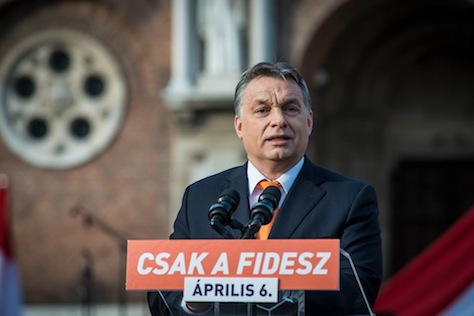Despite a united opposition front, prime minister Viktor Orbán is headed to a crushing victory in Hungary’s April 6 parliamentary elections this weekend, consolidating his hold on power in the emerging central European country of 10 million.![]()
Orbán’s victory looks so assured that it’s hard to believe anyone ever thought that his chances for 2014 reelection would be much tougher.
Only a year ago, Orbán appeared to have a much more troubled path to victory.
For example, an Ipsos poll from January 2013 shows that the three largest of the five parties that comprise the opposition, Osszefogas (‘Unity’), would win a combined 43% of the vote, compared to just 41% for Fidesz – Magyar Polgári Szövetség (Fidesz – Hungarian Civic Alliance). The largest opposition party, the Magyar Szocialista Párt (MSzP, Hungarian Socialist Party) won 32% of the vote.
* * * * *
RELATED: Hungarian left unites, but will it be enough to stop Orbán?
* * * * *
But the most recent March 31 Századvég poll gives Fidesz 51% of the vote, with just 25% for Unity. The far-right, anti-Semitic, ultra-nationalist Jobbik Magyarországért Mozgalom (Jobbik), which has surged over the past six months, would win 18%, and there’s a chance that it could actually win more seats on Sunday than the center-left Unity.
In early 2013, despite an uphill challenge under new election rules, designed to benefit Fidesz, the opposition had a strong case against Orbán, who has isolated Hungary from the rest of the European Union, increasingly chipped away at democratic checks and balances and the rule of law, and nearly torpedoed an already struggling economy with tax increases, further budget cuts, and a haphazard nationalization of Hungry’s private pension system.
What happened? Continue reading How Hungary’s Viktor Orbán got his groove back

